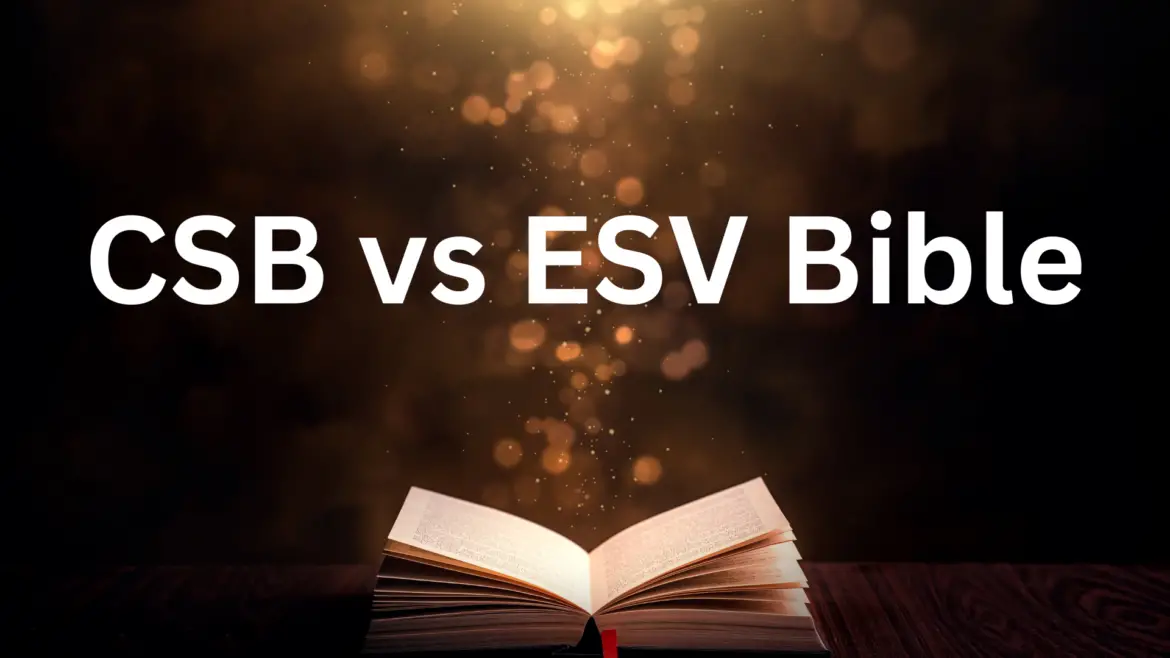The CSB (Christian Standard Bible) and ESV (English Standard Version) are two of the most popular modern translations of the Bible, with many readers using them as their go-to versions.
But how do these two versions compare? Which one should you use for your reading and study?
Here, we’ll explore how these two Bibles differ and which is best for your purposes.
Origin of CSB and ESV Bible
CSB is a more recent translation that has been translated from the original languages (Hebrew, Aramaic, and Greek).
The ESV Bible was the first to be translated directly from the original languages using software like Logos and Accordance.
The CSB is more popular, and you’ll find it in most public places with Bibles on display or for sale.
Some people prefer this version because they feel it has a better flow between sentences than ESV does.
Translation
The CSB translation is based on the ESV translation. The CSB translation is not literal but rather a dynamic equivalence translation.
In other words, it considers the meaning of words and how different readers will understand them in different settings.
For example, in some places, it uses “water” instead of “baptism” when referring to baptism ( 1 Corinthians 10:2-4).
Style
The CSB and ESV are modern English translations, meaning they use common words in everyday life.
But one translation is more conversational, while the other is more formal.
The CSB has a more conversational style than the ESV English Standard Version.
The language used in the CSB tends to be simpler and easier to understand than other translations like KJV or NKJV.
In addition, this translation includes footnotes at the bottom of its pages that explain difficult passages and offer guidance on how to interpret them correctly.
In contrast, ESV Bible uses highly academic terminology, so it’s often harder for people who don’t have extensive knowledge about biblical languages or ancient cultures to understand what they’re reading from these pages, even if you have read through the entire Bible several times before!
Reading and Comprehension Level
The CSB is generally easier to read than the ESV. The CSB uses a more casual writing style, making it feel less intimidating and more approachable than the ESV.
This is most evident in its vocabulary, with fewer difficult words and more straightforward terms.
An excellent example of this can be seen in this portion from Psalm 104:24: “You make springs gush forth in valleys; they flow between hills….”
In comparison to other translations, this sentence may not seem too difficult or unusual; however, it contains several words that are unfamiliar or hard to define (such as ‘gush’).
By contrast, when reading through Proverbs 30:5-6, it will be clear just how much simpler CSB’s style can be compared to other Bible translations.
“Every word uttered by God is flawless, he is a shield for all who take refuge in him.”
Purpose of Each Bible Version
CSB is a translation of the Bible from Hebrew and Greek into English.
ESV is a revision of the RSV, which means it’s not just a new English translation but has quite a few other changes, such as updating words or phrases.
The CSB focuses on making it more readable while staying very close to what was initially written in Hebrew and Greek texts.
In contrast, the ESV focuses on keeping as much of the original wording intact while making it clear and easy to understand what they’re saying.
However, some words may seem outdated today because they’re so formal sounding compared to other modern translations like NIV or NLT.
Pronunciation Guide
The Center for Scripture Study Bible (CSB) and the English Standard Version (ESV) are excellent translations.
They’re also very similar, so if you like one, you’ll probably like the other. However, they have some significant differences to consider before buying a copy.
One of the significant differences between the CSB and ESV is how they handle pronunciation guides at the bottom of each page, and it’s not about pronunciation guides for proper names but relatively common words that don’t appear in most dictionaries!
Both versions have these pronunciation guides available on each page; however, only one version has them set apart from other notes and marked with boldface type.
Footnotes and Cross-References
One of the biggest differences between the CSB and ESV is how they handle footnotes and cross-references.
While neither Bible is perfect in this department, one stands out as having a better user experience: The CSB.
The CSB has more footnotes than its counterpart ESV but has more cross-references than either NIV or NASB.
This means that if you’re looking for something specific in your study of God’s Word, whether it be an explanation of a difficult verse or an insight into some aspect of theology, CBS is better equipped.
Bible verse Comparison
CSB
1. 2 Timothy 3:16 All scripture is given by inspiration of God and is profitable for doctrine, for reproof, for correction, for instruction in righteousness: 17 That the man of God may be perfect, thoroughly furnished unto all good works.
ESV
1 Timothy 3:16 All Scripture is breathed out by God and profitable for teaching, for reproof, for correction, and for training in righteousness, 17 that the man of God may be complete, equipped for every good work.
CBS
2. 1 Corinthians 13:8 Love never fails; but if there are gifts of prophecy, they will be done away; if there are tongues, they will cease; if there is knowledge, it will be done away.
ESV
2. 1 Corinthians 13:8 Love never ends. As for prophecies, they will pass away; as for tongues, they will cease; as for knowledge, they will pass away.
Best For Bible Studies
CSB is best for Bible studies, and ESV is for personal reading.
CSB is best for reading aloud because it uses the same pronunciations as you would use in English.
ESV uses words that are more accurate but can be confusing to read out loud at first if you’re not used to them.
Best For Devotionals
CSB is best for devotionals because its translation more closely follows the original language and structure of scripture.
ESV is better for personal reading because it has a more natural feel to it, making it easier to read without having to refer back to a study Bible or commentary.
Best For Preaching And Teaching
CSB is best for preaching and teaching because it provides a more literal translation of the original language.
ESV, on the other hand, is better for understanding the nuances of scripture, as its translation follows a more literary approach.
Pros and Cons of the CSB Bible
Pros
The CSB is easy to read because it uses modern English. It stays very close to the original Hebrew and Greek texts of the Bible.
It’s a good choice for those who have trouble reading other translations because it doesn’t use difficult vocabulary or complicated sentence structure.
This makes it a good choice for children and teens too.
Cons
The CSB does not follow any particular translation philosophy, so it does not add new information from other resources like commentaries and study notes.
This means it won’t help you understand some of the deeper meanings behind biblical passages as much as other translations might.
Pros and Cons of the ESV Bible
Pros
Accurate: Because it’s based on older translations that have been corrected over time, this translation is very accurate.
If you’re looking for an accurate Bible translation, then this may be one you want to consider reading.
Readable: Another benefit of this translation is that it’s easy to read because it uses more modern language than most other translations.
You don’t have to worry about stumbling over archaic words or phrases when reading this version because those things have been removed from it if you want a readable Bible that doesn’t use difficult wording.
Cons
There are some drawbacks to using this Bible version as well. For example, some Christians prefer more dynamic translations such as The Message or The Living Bible because they provide more freedom when interpreting scripture and allow the reader to put more emphasis on certain concepts than they might otherwise do with a word-for-word translation as this one does
Does the CSB Bible have missing verses? And what are some of them?
The CSB Bible has no verses missing, added, or changed from previous versions of the English Bible.
The CSB is also not known to contain any verses omitted from previous English translations.
In other words, the CSB is an accurate translation of Scripture that can be trusted and relied upon to convey God’s Word in English today accurately.
Does the ESV Bible have missing verses? And what are some of them?
Yes, the ESV Bible does have missing verses. This is not a problem, and it’s not different than many other versions. Matthew 10:14–15, Acts 23:9, and Acts 13:42 are among the verses missing in ESV.
This is because these translations were translated from older manuscripts that did not contain these portions of scripture.
If you want to know what those passages say, you should consider buying an edition of the ESV Bible with critical apparatus or try searching for the verses on BibleGateway.
Which Bible Version is Best?
The best version overall would be the CSB, as it provides an accurate and literal translation of scripture while also making it easier to read aloud.
Its translators also strive to keep the meaning of scripture intact while making it easier for modern readers to understand.
This makes it an ideal choice for Bible study, devotionals, preaching, and teaching.
Places To Read The ESV and CSB Bibles
These Bibles are available in different versions for kids, women, or men.
You can listen to them as well, which is very nice for someone who has trouble getting the time to read. Check them out and see if you like any of them.
Conclusion
The CSB is a good option if you want something easy to read and understand.
It has many useful features and excellent resources, such as the pronunciation guide, which makes it easier to pronounce unfamiliar words correctly.
The ESV Bible is a good choice for those who want something more traditional or prefer reading the King James Version over other translations like the NIV or NASB.


